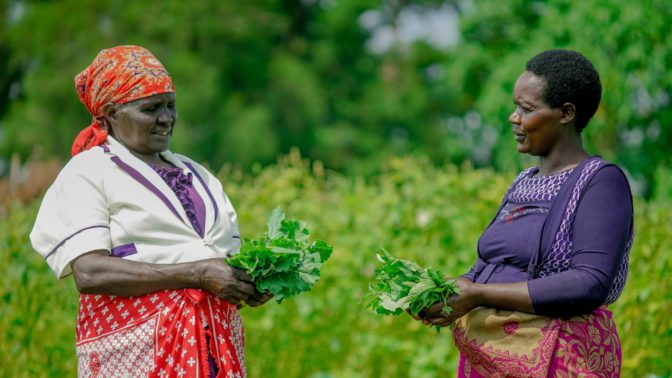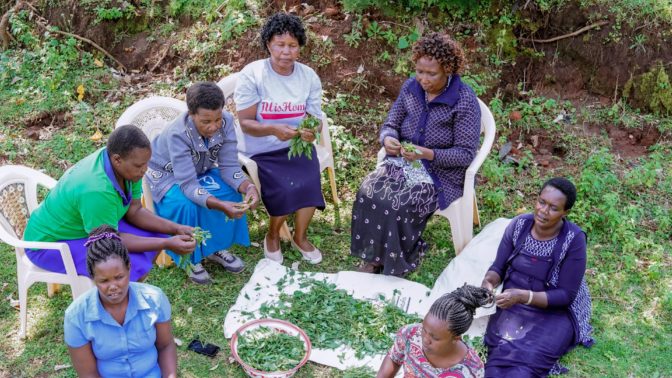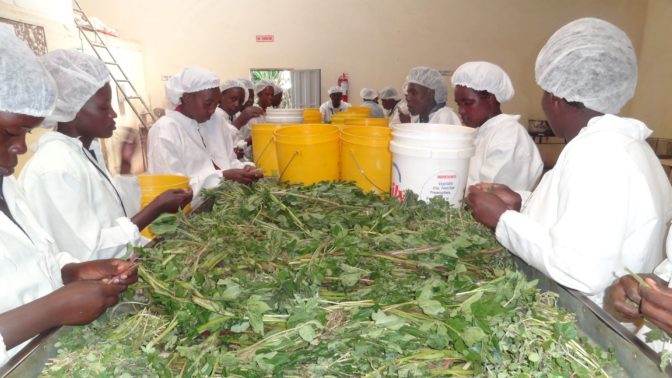Mace Foods: African Leafy Vegetables- Training for Farmers
Commercialization of African leafy vegetables by rural female communities in Kenya
Key Facts
- The increased awareness of the healthy properties of non-nutrient bio-active compounds found in fruits and vegetables has brought a lot of attention to their role in playing a vital part of daily diets.
- For Kenya and Sub-Saharan Africa, the attention on vegetables as a vital dietary component is significant, as leafy vegetables have long been indispensable ingredients in traditional sauces that accompany carbohydrate-based staples.
- By 2030, more than 50% of the rapidly increasing African population will depend on urban food systems for meeting their dietary needs and rising aspirations in the consumption of food.
- Mace Foods processes six varieties of leafy vegetables - Black Nightshade, Spider Plant, Cowpeas, African Kale, Amaranth, and Jute Mallow.
- Mace Foods’ solutions will increase the number of vegetables handled over a fixed period at the processing facility from current 32% to over 72%.
Key Features
The demand for traditional vegetables has been on the rise in local, urban, and regional markets. With its service and product, Mace Foods Ltd aims to bridge the supply and demand gap seen between rainy and dry seasons by conveniently providing pre-cooked, high quality, hygienic, nutritious leafy vegetables for large institutions and schools. This saves time to go through the rigorous process of selecting, plucking, cooking, and serving these vegetables on a regular basis.
Mace Foods Ltd intends to work with women and youth to participate in production of traditional African leafy vegetables.
Since the process of plucking will be moved from the factory to the farm level, the direct impact to our business will:
- Reduce processing time leading to reduction of overall cost of production by 16%.
- Reduce losses due to delays in drying during the processing lead time.
- Improve lead time by 92% compared with current turnaround time for vegetable
processing.
Social Impact
Before the COVID-19 pandemic, farmers supplied vegetables including the stalks and leaves. The separation of the leaves from stalks was done at the factory using hired seasonal workers. Due to the restrictions and in compliance with the Ministry of Health’s manufacturing distancing protocols, we have developed a method for the farmers to separate leaves from stalks at the household level. The technologies we are introducing will be better than the current practice because:
- The farmers will earn more money by supplying ready-to-use vegetables. This
introduction at farm level will increase their income by 30%. - The health and nutrition of the farmers will improve over a period of time since
the consumption of African leafy vegetables will increase. - The activity of plucking the vegetables will shift the employment creation from the
factory to the villages thus creating useful employment for the women & youth. - Composting vegetable waste will create much needed nutrients for the soil of the
farms, thus, creating nutrient rich fertile soils at almost no cost.
The project will positively impact the producers as follows:
- Due to an overall increase in incomes at the farmer level, this will lead to
increase in the sizes of land dedicated to the production of African leafy
vegetables and increase the number of smallholder farmers benefiting directly
from increased incomes. - The availability of the African leafy vegetables at local informal markets will
lead to increased consumption of nutritious vegetables and hence healthier
lifestyles. - Increase in the quantity of cultivated vegetables will also increase village-
level employment creation right from on-farm production to the post-harvest
handling of the vegetables using the proposed technologies.
Future Plan
As the lead firm, we will provide pre- and post-process support as follows:
- All farmers will receive training on Good Agricultural Practices, harvest and post-harvest handling of the crop.
- The specific technologies will also be introduced using a practical training
approach for every farmer. - As a sustainable approach model, we intend to increase the number of grading
centers post as the volume of sorting/grading vegetables increases.
Main Target Group
Smallholder farmers spread in five counties in Kenya.
Main User
Our target end consumers are 18 to 65 years old, from lower to upper class citizens families. Regarding the delivery of safe and nutritious food, they bring the need for innovation in value chains to towns and cities. This target population will be made up of approximately 62% women and youth.
Price (in USD)
n/a



